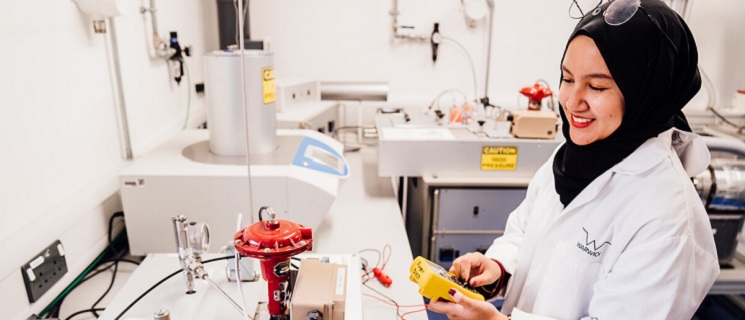Doctor of Philosophy (PhD/MPhil) P-H1Q2

Doctor of Philosophy (PhD/MPhil)
Engineering
To satisfy the requirements of the degree of PhD, a thesis must constitute a substantial original contribution to knowledge and is, in principle, worthy of peer reviewed publication
The structure for the PhD/MPhil at the University of Warwick is a four-year registration (typically three years of tuition fees), part-time study is a seven-year registration (five years of fees pro-rata).
Students register in the first instance for the degree of MPhil unless otherwise approved by the Board of Graduate Studies. Subject to satisfactory progress, registration may be upgraded to the degree of PhD. As a PhD student,the expectation of the University is that you need to work with your supervisor and aim toward your thesis submission by the end of the third year, utilising the extension year/s if needed solely for the purpose of writing the thesis. The final year is expressly not for undertaking any further research or fieldwork.
You will be allocated a supervisor and in some instances a co-supervisor with whom you will be working closely with for the duration of your registration. As a research student, you will be well motivated and able to self-manage your time effectively. Meeting your supervisors regularly and at a minimum once per month, recording the meetings to evidence the delivery and progression of your research. There will be documents that you need to prepare in the first few months of your registration and prior to your formal annual review meeting. A progress review panel is established for each student to monitor progress and give advice; the first review is usually within the first two months of registration, a formal review after approx. 9 months and annually thereafter subject to satisfactory progress.
We have School events and symposiums for you to get involved in to showcase your work and achievements. During your registration, you are required to maintain a monthly progress record of your outputs that include items such as; thesis chapters, papers and posters. Progress and attendance will be formally monitored throughout your registration. Our research supervisors are specialists in their fields and offer an effective mix of academic input and practical application which will equip you with the knowledge, skills and tools.
At Warwick, we are committed to supporting you as a Postgraduate Researcher both professionally and personally. We aim to equip all our Postgraduate Researchers with the skills, knowledge and attributes to enable you to thrive as an independent research professional and prepare you for your next career steps with our Professional Development Training Programme.
Master of Philosophy (MPhil)
To satisfy the requirements of the degree of MPhil a thesis shall constitute an original contribution to knowledge. The thesis shall be clearly and concisely written and well-argued and shall show a satisfactory knowledge of both primary and secondary sources. In addition, it shall contain a full bibliography and, where appropriate, a description of methods and techniques used in the research.
The maximum length of the thesis is 60,000 words, which in the Faculty of Science shall be exclusive of appendices, footnotes, tables and bibliography. An appendix may not exceed 5,000 words in length unless permission to exceed this length is given by the Board of Graduate Studies. A student must attend an oral examination, which shall cover the thesis itself and the field of study in which the thesis has been written. The examiners may also require the student to take a written and/or practical examination. The student must complete satisfactorily the oral examination and written and/or practical examination, in order to satisfy the requirements for the degree.
Doctor of Philosophy (PhD)
To satisfy the requirements of the degree of PhD, a thesis must constitute a substantial original contribution to knowledge and is, in principle, worthy of peer-reviewed publication. The thesis shall be clearly and concisely written and well-argued and shall show a satisfactory knowledge of both primary and secondary sources. It shall contain a full bibliography and, where appropriate, a description of methods and techniques used in the research.
The maximum length of the thesis is 70,000 words in the Faculty of Science. These limits are exclusive of appendices, footnotes, tables and bibliography. The total length of all appendices combined may not exceed 5,000 words in length.
A student must attend an oral examination (viva voce), which shall cover the thesis itself and the field of study in which the thesis has been written. The examiners may also require the student to take a written and/or practical examination. The student must complete satisfactorily the oral examination and written and/or practical examination, in order to satisfy the requirements for the degree.
Application form 'Course search':
Department: School of Engineering
Academic Year: 2024/25 (for entry in September 2024, January 2025 or April 2025)
Academic Year: 2025/26 (for entry in September 2025, January 2026 or April 2026)
Type of Course: Postgraduate Research
In order to come to Warwick, you need to hold an unconditional offer. All applicants must satisfy the general postgraduate admissions requirements and also those of the course that they wish to pursue.
- A research proposal of 1 or 2 pages that outlines your specific research interests that are aligned with the research expertise in the School of Engineering. The research that you will conduct before applying will give you an overview of the research activities areas to find if it is possible for you to undertake a doctorate. When you feel confident that you can contribute to the research carried out within the School, you can then begin your application.
- Admission for a PhD requires at least an upper second class honours standard or the equivalent and/or a Master's degree at Merit level or its equivalent.
- Two academic references. You should nominate referees who can provide an informed view of your academic ability and suitability for your chosen programme of study.
- English Language Qualifications: If your first language is not English you will be expected to obtain one of the following recognised English Language qualifications:
- IELTS: Overall score of 6.5 with no component less than 6.0
- TOEFL (iBT) and TOEFL (iBT) Special Home Edition: 92, comprising Reading 22, Listening 21, Speaking 23, Writing 21
- Other accepted English Language Tests are accepted hereLink opens in a new window
Q. How do I know if my qualification grade is equivalent?
A. Overseas Qualifications: UK Equivalent ScoresLink opens in a new window: Stated equivalents are neither absolute nor complete. Satisfying the grade requirement of your course is only one aspect of the application and does not guarantee admission.
Q. Do I need an ATAS?
A. ATAS: If you are from outside the EU you may require ATAS clearance. Full instructions about this process and how to apply will be sent to you after an offer for admission is made. Please do not attempt to apply for your ATAS before you have received instructions from the University, as an incorrect application will invalidate your ATAS certificate and may cause delays.
Click here for the 'Research Degree Application Checklist' and application formLink opens in a new window.
Take a look at the proposed project titles from the themes below.
Typically, the named projects will not automatically come with funding unless specified. View our scholarships and projects page.
Civil and Environmental Engineering
Ground Engineering
Structural Engineering
Water Engineering
Mechanical, Materials and Process Engineering
Chemical Engineering
Fluids
Materials
Measurement
Sustainable Thermal Energy Technologies
Electrical and Electronic Engineering
Connected Systems
Electrical Power
Sensors and Devices
Systems and Information Engineering
Biomedical and Biological Systems
Information Engineering
Systems Modelling and Control
There are two main costs for students undertaking postgraduate study - academic fees and living expenses.
Tuition fees
Tuition fees are payable for each year of your course at the start of the academic year, or at the start of your course, if later. For details of the fees and how to pay, please review the Warwick Student Finance pages - Engineering are 'Standard Course Fees Band 2.
Living expenses
As well as tuition fees, students should budget for accommodation, food, books and other general expenditure such as clothes or leisure. Living costs will depend upon your lifestyle and spending patterns.
International students must be able to prove they have the necessary funds to cover these expenses. For more information on all costs see living expenses.
Scholarships
The School of Engineering offer scholarships throughout the year, check the page regularly for the latest funding opportunities.
- Contact the School of Engineering Team.
- Application Enquiries contact the Postgraduate Admissions Team.
- Book your visit to the School or join us on our virtual open day.
- Sign up to receive more information about Warwick.
- Telephone: +44 (0) 24 7652 2046 or +44 (0) 24 7652 4826
Postal address:
Postgraduate Office
School of Engineering
Library Road
University of Warwick
Coventry
CV4 7AL
My decision to study for PhD at Warwick was informed by the school’s reputation for world leading research.
Hear more from Dr Oluyemi Jegede and other students in the School of Engineering
360 Virtual Tour
Want to see what our facilities look like?
Click on the link below to watch our 360 degree virtual tour of the School of Engineering.
Please note that if you are watching the video on an IPhone you will need to watch via the YouTube app rather than through the Safari browser.
Essential Information
Qualification Aim:
Doctor of Philosophy in Engineering (PhD)
Course code: P-H1Q2
Duration:
3-4 years full-time or 5-7 years part-time.
Application deadline:
None, applications accepted all year round.
Course Start Date:
30th September 2024
6th January 2025
1st April 2025
Location of study:
School of Engineering, University of Warwick, Coventry, CV4 7AL, United Kingdom
Equality, Diversity and Inclusion
The University of Warwick provides an inclusive working and learning environment, recognising and respecting every individual’s differences. We welcome applications from individuals who identify with any of the protected characteristics defined by the Equality Act 2010.

